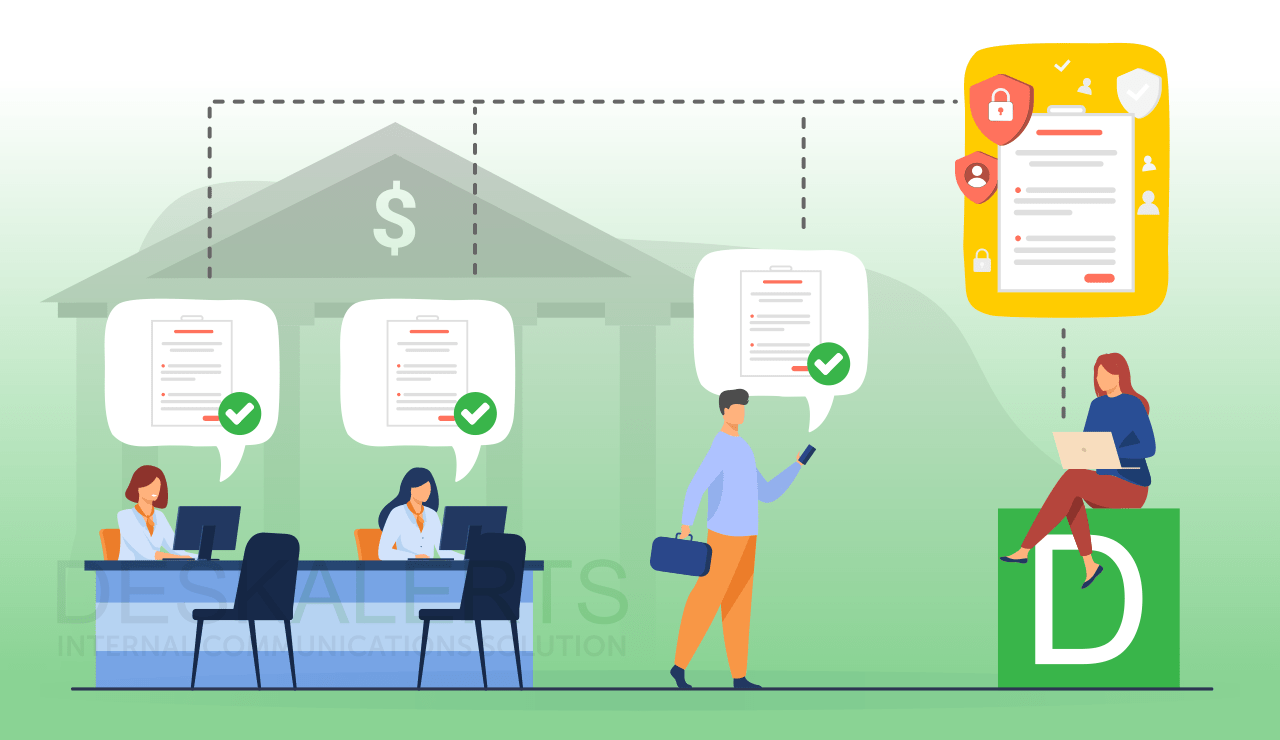
The banking and finance industry has increasingly faced growing regulation around the world. It’s therefore essential that all employees in these institutions understand the requirements and what is expected of them in ensuring that their organization remains compliant with laws and rules. To do this you need to have good compliance communication procedures in place – one of the most important types of financial communications.
What is compliance for banks?
Compliance for banks includes understanding the regulatory requirements – including operational processes and procedures – in the jurisdiction that the bank operates in. There may be multiple regulatory issues for the bank, particularly if it operates in multiple jurisdictions.
The bank or financial institution needs to implement protocols that sees it meeting these regulatory requirements – both internally and externally. This is essential for preventing, detecting and investigating any issues within the organization that could see it fall into non-compliance.
An effective bank compliance program includes ensuring employees are literate in the regulatory requirements and are accountable, and the organization has appropriate mitigation strategies in place for any compliance risks. It’s important that compliance is appropriately resourced in terms of staff allocated to it and any tools needed to carry out compliance tasks.
When banks don’t have effective compliance programs in place, they can face adverse action from regulators. This can include fines and penalties, civil and criminal court proceedings, reputational risk, and ongoing scrutiny from regulators.
The importance of policy and procedures for banking compliance
Most employees in the bank are not going to be experts on all the different regulations that the bank must comply with. They’re also not likely to be across ongoing changes in the regulatory environment that in turn will change the bank’s internal policy.
Developing appropriate bank policies and procedures ensures that you can communicate laws and regulations – which are often very complex – to your banking employees in a way that they can understand.
Compliance policies and procedures are an important tool for banks to ensure that employees have clarity and a consistent approach. These documents can help your employees to understand what actions could see them violate a law, and also understand if they would be breaching internal policies.
Having policies and procedures not only provide compliance guidance to your staff, but can also empower them by giving them a framework that ensures they do the right thing.
Policies and procedures also provide your organization with some protection from risk by giving you the ability to prove that all appropriate measures and systems were put in place to avoid non-compliance. If there is wrongdoing (deliberate or negligent) by an employee you can show that it wasn’t because of overall negligence on the bank’s part.
6 tips to ensure compliance in banking
In addition to having compliance policies and procedures in place, there are some additional steps you can take to ensure that your institution is compliant:
1. Appoint someone to take charge of compliance
Having a manager (if possible, supported by a team) with oversight of compliance will help to ensure that your organization is accountable and is on track with various requirements and deadlines.
2. Ensure policies and procedures are easy to find and access
If it is hard for employees to find and access policies and procedures, the chance of them understanding and following them will be slim. Banking regulation is complex and there can be a lot of information that needs to be communicated to employees. Having a centralized location where these documents are kept is essential. It should also be linked prominently from the main page of your intranet.
3. Ensure policy and procedure changes are communicated
Changes to policies and procedures are inevitable – particularly when the regulatory landscape changes so often. It is crucial that you clearly communicate any changes or revisions, and do so in a timely manner. If people don’t know that policies and procedures of the bank have changed, they can’t comply with the new rules and ensure they meet compliance in their everyday jobs.
4. Train staff about compliance policies and procedures
Providing banking compliance training to employees about relevant policies and procedures is the best way to reinforce them. This will step your employees through the requirements so that they know what they need to do to comply, and why it is important that they do. You can then test your employees’ levels of understanding by quizzing them and offering revision and refresher training as needed. When there are new and emerging compliance issues that employees should be aware of, you can create new training modules.
5. Have employees acknowledge compliance policies
A good way to keep employees accountable is to have them sign and acknowledge that they have read and understood and agree to abide by particular policies and banking procedures. You can do this annually, as well as when there is an update to a policy or procedure.
This will provide you with a digital audit trail that you provided the employee with the information and that they acknowledged and agreed to follow. They can’t then claim they didn’t know what was expected of them if a negative situation arises.
6. Create a culture of good governance and compliance
Positive company cultures see good outcomes. When you create a culture that values compliance, ethics, transparency and integrity it will help to ensure you have a well-managed and high-functioning organization.
Leadership is important: your most senior managers need to lead by example and set expectations. They set the standard that employees will follow and will help to establish the idea within the bank that compliance is everyone’s responsibility.
How DeskAlerts can help your bank’s compliance program
DeskAlerts is an internal communication software system that has a number of features that can help to promote compliance within your financial institution.
The system works by delivering information to employees’ computers and mobile devices as well as digital screens throughout your company.
DeskAlerts is designed to be intrusive and eye-catching and will assist with compliance in the following ways:
- Send pop-up notifications and scrolling desktop ticker messages letting people know about compliance policy and procedure updates.
- Send mobile alerts to employees so that they can be reminded of compliance obligations, no matter whether they’re working from the office or at home.
- Create campaigns reminding employees of important compliance information in an eye-catching way, such as using corporate wallpapers, screensavers and digital signage.
- Send reminders about important compliance deadlines. You can even get them to “RSVP” to a deadline so that they remember it.
- Send video content that explains procedures and processes.
- Send quizzes to test your employees’ knowledge and see the results in real time.
- Request reading acknowledgments from employees to show that they have read and understand the compliance policy information you have sent.
DeskAlerts guarantees that 100% of your messages will be seen by employees, making it a much better option to send important information than email or solely relying on your intranet.
Messages can be scheduled ahead of time to be sent at a different date. They can also be scheduled to repeat so that people get the information several times.
You can send to custom audiences so that you don’t bother the entire organization with niche information: for example if you need your accounting team to know about important end of financial year updates you can send only them that information and not the rest of the organization.
***
Your bank or financial institution cannot afford to be non-compliant with the regulations in your jurisdiction. While compliance can be a daunting topic, DeskAlerts will make it easier to manage compliance for banks. Get in touch with our team of experts today to find out how you can implement our system.
Frequently asked questions
Who is responsible for ensuring compliance in the bank?
The senior management of the bank are ultimately responsible for ensuring that it is compliant with its obligations.
What is compliance in a bank?
Banking compliance is a term that describes the act of a bank or financial institution complying with various laws, regulations and internal and external guidelines. The function is to detect, prevent and address any deficiencies, illegalities, deviations or other non-compliant behavior in the organization’s activities.
What is compliance risk in banks?
Compliance risk in banks refers to any risk to earnings and capital as a result of violations of or non-adherence to any regulations, laws, rules, codes of conduct or ethical standards.
How can banks improve compliance culture?
Banks can improve compliance culture in the following ways:
- Having leaders model the appropriate behaviors and standards
- Having clear policies and guidelines about compliance
- Ensuring employees understand the role they play in compliance
- Ensuring accountability and transparency
- Having good compliance communication practices in place
What is financial compliance?
Financial compliance describes how a business follows any laws or rules in its jurisdiction and any other regulations that govern how financial institutions must operate.
 Caroline Duncan
Caroline Duncan







